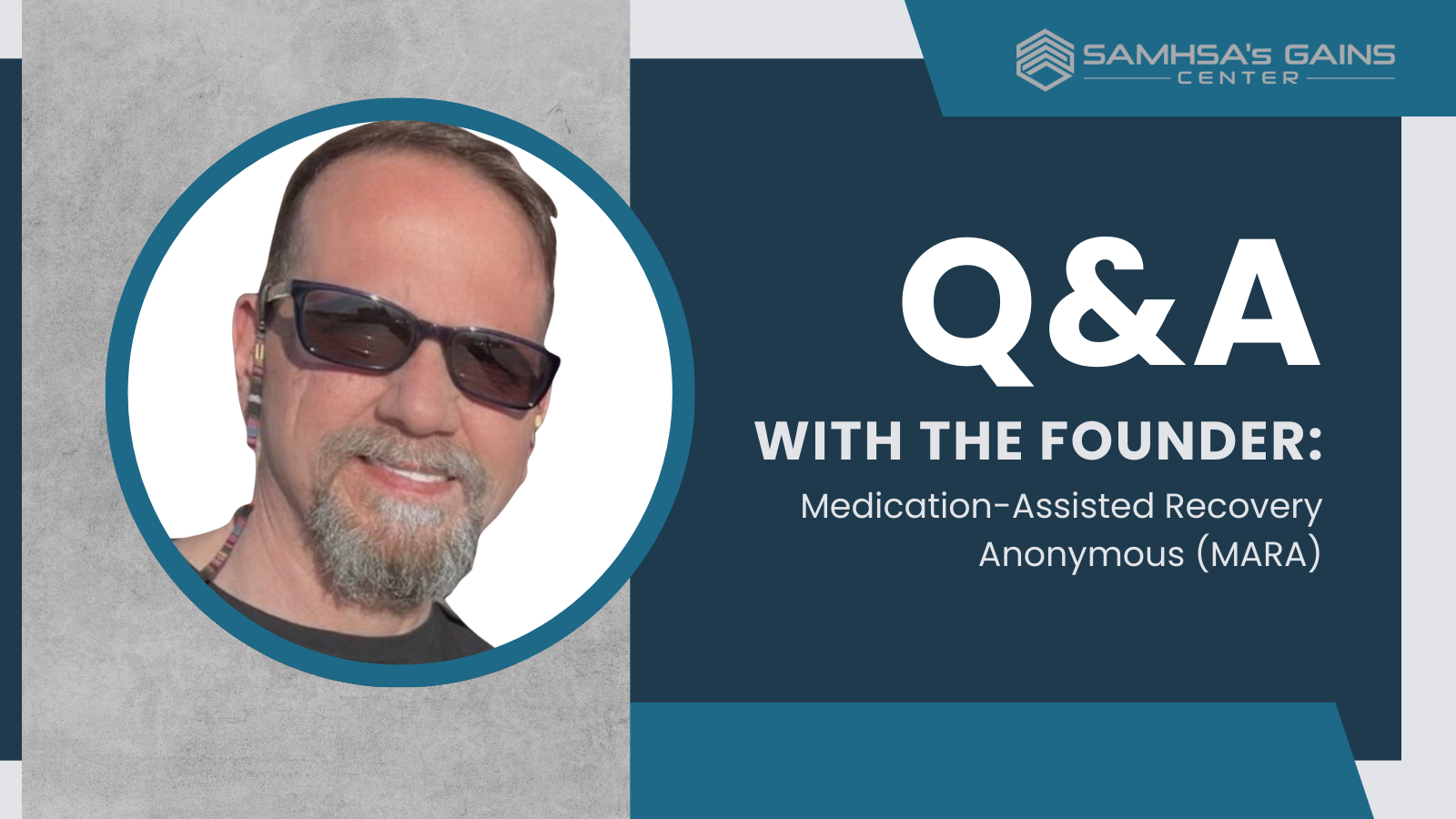Jeff is the founder of Medication-Assisted Recovery Anonymous (MARA), a supportive and nonjudgemental recovery community created to help individuals achieve and maintain a safer lifestyle. Editors’ note: To maintain Jeff’s confidentiality, the GAINS editorial team has omitted his last name from this article.
What motivated you to start MARA?
In many ways, MARA is a direct outcome of my life experiences. At a young age, I started using alcohol and drugs to cope with my fears. At age 14, I was expelled from school. Despite various stays at addiction treatment centers and psychiatric hospitals, I repeatedly returned to substance use until I was incarcerated at age 21. While there, I earned my GED. I was released when I was age 38. Since then, I’ve earned a bachelor’s degree in psychology and an MBA in healthcare management. In 2017, I became a licensed chemical dependency counselor.
Through my personal recovery, as well as my work providing substance use disorder (SUD) services in correctional facilities, I recognized a need for an alternative to traditional recovery meetings. This recognition was prompted by several things that occurred around the same time. First, I heard comments at traditional recovery meetings that were off-putting. I like traditional meetings, but they are not for everyone.
Second, I asked in a traditional 12-step online group if people using medication-assisted treatment (MAT) needed their own meetings. I received about 100 responses similar to, “If they wanted it bad enough, they would quit cold turkey like I did!” When I read these responses, I knew the answer was yes.
This was confirmed when I asked groups of people in custody, “Who wants to stay sober when they get out?” Ninety percent would raise their hands, but very few raised their hand when I asked, “Who’s going to do the 12 Steps?” They struggled with certain Steps, such as the perception of being directed to believe in God, and words within the Steps, such as “powerless” and “restore to sanity.”
I did some research online and found that there had been similar abstinence-based groups for people using MAT in the past. To make a program sustainable, I believed it needed to be more than MAT-friendly. At the time, I was working in a women’s prison, where we held a few meetings for individuals in custody. They offered suggestions for what the program should look like. Many of those suggestions were incorporated into what is now known as MARA.
To make recovery meetings more universally acceptable, I created Steps and Traditions for MARA. Our first Step states, “We admitted that, without help, we have an inability to control many of our behaviors and that our lives had become unmanageable.” This wording speaks—not to powerlessness—but to the nature of SUD as a chronic disease that hinders our ability to make decisions and handle stress. And it acknowledges the need for help, which may mean medication. In fact, the first step could be revised to, “We asked for help and received hope.”
How have the MARA Steps helped you personally?
In too many ways to describe! But here is a specific example: For 25 years, I considered myself a “bad” reader due to an experience in grade school. Step 4 changed all of that. It reads, “We made a detailed inventory of our strengths, weaknesses, and misconceptions.” I looked more closely at my reading ability, asking myself, “When did I first start believing this? Do I remember who may have planted this belief in my mind?” This exercise led me to realize that I am a slow reader, but my comprehension is strong. When I gave myself adequate time, I received As all through college. Once I corrected the misconception of “bad” equaling “slow,” I moved “reading” from my list of weaknesses to my list of strengths. It was very freeing.
The bottom line for the MARA Steps is self-actualization!
You recently published a book about MARA. What prompted you to undertake this project?
I thank my sister for helping me finish Medication-Assisted Recovery Anonymous (MARA), which I wrote in response to MARA participants who wanted to supplement the support of MARA meetings with more actionable activity. The book contains a description of the Steps and Traditions, as well as guidance on doing the Steps. I also included real-life stories of people who have found MARA and MAT beneficial for their personal recovery.
I’m excited about the book; it takes readers through a guided journey to living a safer lifestyle, regardless of how they define recovery. Take, for instance, a man who goes from injecting drugs 7 days per week to 1 day per week, or perhaps not injecting at all but now smoking marijuana. MARA doesn’t encourage any type of drug use. We do, however, consider being safer a positive action. While not abstinent, he’s made progress. That may be all he can do right now, and that’s okay. Or consider a woman who is managing opioid use disorder with methadone. We don’t advocate or even mention getting off medication during MARA meetings; that discussion is between her and her doctor.
You have a lot on your plate with MARA. What do you do to relax?
I meditate every morning, which really helps still my mind. I spend most of my free time with my family. My wife and I participate in pro knife-throwing competitions together. I’m also an avid concertgoer. I also try every day to help someone, regardless of the size of the kindness. It may be delivering meals to people who can’t get out, or helping someone get their groceries to the car, or even anonymously cleaning a convenience store bathroom. Don’t get me wrong; I’m talking about only a 2-minute cleaning, leaving it better than I found it! Doing good things renews me.
Like what you’ve read? Sign up to receive the monthly GAINS eNews!


